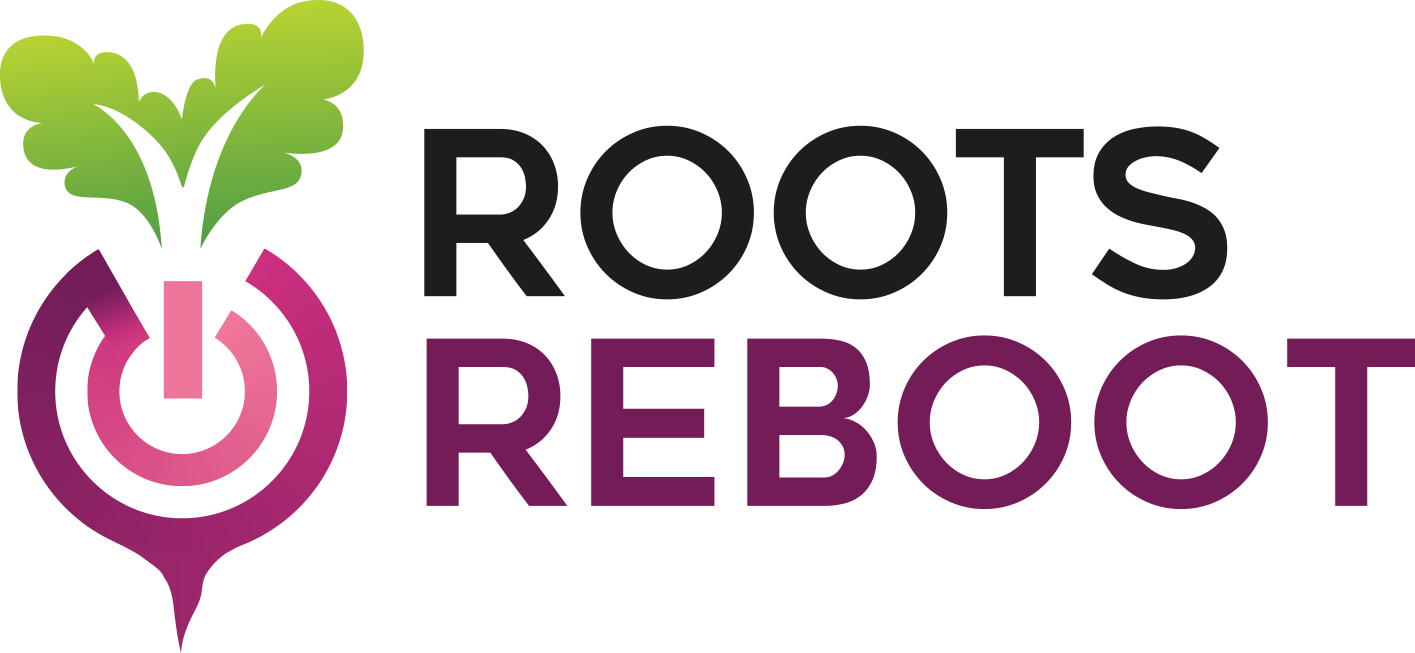debunking 5 diabetes Myths
Do you feel like you don’t even know what nutrition advice to believe anymore?
Have you ever felt overwhelmed on a daily basis when trying to decide what to eat?
If so, you are not alone!
It is difficult sifting through ALL of the nutrition information out there & finding advice you feel confident in & can TRUST.
After spending a few years working with an American Diabetes Association Accredited Diabetes Self-Management Training program, I developed a true passion for all aspects of diabetes prevention and management: nutrition, exercise, medication, and stress management. By forming trusting relationships with hundreds of clients, I watched them make lasting changes in their lives by preventing and reversing Diabetes!
As the Roots Reboot Pre-Diabetes/Diabetes Specialist, I will take the role as the Diabetes Myth Buster & discuss some of the most common misconceptions around blood sugar management! As a Registered Dietitian, I often see overwhelmed clients who are frustrated & confused with all of the conflicting messages in the nutrition world and I hope to clear up your confusion! I will provide you with the FACTS, the evidence based research on the latest scientific research.
Here are the 5 common misconceptions on
blood sugar regulation that I get asked from clients:
1.Myth: “I need to follow a low carb diet / cut out carbs. No bread, no pasta, no rice, no potatoes.”
ask the rd: What are included as carbs?
Carbohydrates are 1 of the 3 essential macronutrients and is our body's preferred energy source and our body relies on carbohydrates to run efficiently. Sources of complex carbs provide a slow release of energy, keeping you energized throughout the entire day. However, carbs seem to always get a bad rap and many fad diets recommend limiting our carbohydrate intake.
Some examples of complex carbohydrate containing foods are:
Amaranth
Barley
Corn
Brown or Wild Rice
Farro
Fruit
Millet
Quinoa
Legumes such as black beans, chickpeas, pinto beans, peas or lentils
Oats
Potatoes
Vegetables
Whole wheat bread
Whole grain flour
Whole grain pasta
And so many others!
Basic human physiology shows that the brain cannot use amino acids (protein) or fatty acids (fat) for energy. Therefore, our brain actually requires 130 g of glucose (carbs) per day just to carry out basic functions.
ask the rd: What is insulin resistance?
When it comes to diabetes, it is important to understand that insulin resistance underlies all forms of diabetes. Insulin resistance is the storage of fat in tissues (called intracellular fat). Therefore, carbohydrates are not the enemy, nor the cause of diabetes!! As long as your fat intake is low, Whole grain, whole food sources of carbs are nutrient dense, filling, and will keep you full for a long period of time without spiking your blood glucose. A growing body of evidence now shows that diets low in fat and high in unrefined carbohydrates from fruits, vegetables, beans, lentils, and whole grains are remarkably effective at reversing insulin resistance in patients with type 1 diabetes, pre-diabetes, and type 2 diabetes. These people who eat a low-fat, plant-based, whole-food diet actually improve their glucose tolerance and become highly efficient at clearing glucose from their blood.
So, with that being said, whole carbohydrate-rich foods should not be limited, they should be included at the center of the plate for all people living with and without diabetes. They are nutrient dense and will keep you full for a long period of time without spiking your blood glucose (as long as you’re following a low fat diet).
your Reboot challenge:
Just as we recommend to eat a wide variety of fruits and vegetables to make up a well-balanced healthy diet, the same rule applies to grains! If you are currently only consuming 1 or 2 whole grains, I encourage you to incorporate more variety into your diet. Whether it be the more “exotic” sources or simply switching over to brown rice, start by trying one unfamiliar source (listed above) each week and experimenting with different recipes!
2. myth: “Fruit has too much sugar”
Fruit should most definitely be included as part of a well-balanced, healthy diet, even if you have diabetes or are managing your blood sugars. Fruit is low in both calories and fat, while containing many beneficial nutrients such as: water, antioxidants, vitamins, fiber and minerals. These nutrients are essential for improving our overall health. Fruit has been shown to reduce risk for chronic disease (including developing Type 2 Diabetes) and can actually improve insulin sensitivity.
A few of the many health benefits of consuming fruit include:
Anti-aging effects
Decreasing risk for chronic disease (including Type 2 Diabetes)
Lengthen average lifespan
Protection against cancer
Weight loss or maintenance
ask the rd: What are the recommendations?
Try to get a wide variety of different colors and nutrient dense fruits everyday to prevent disease. The best choices are fresh or frozen fruit. Make sure to decrease empty calories with added sugar by limiting or avoiding fruit juice or fruits canned in syrup.
your Reboot challenge:
Have you ever heard the saying, “make your plate a rainbow”? Well this phrase is completely true and wonderful advice. Rather than focusing on one specific “diet,” keep it simple and start by trying to incorporate at least 3 different colors of both fruits and vegetables each day. Once you have accomplished that, try for 3 different colors in the same meal.
3. myth: “Follow a high fat, high protein diet approach.”
First let’s just say that yes, if you controlled your carbs to 30 g or less per day, you would be able control blood sugars. However, you are treating the result or symptom of diabetes not using a functional medicine approach and treating the root cause of the problem! This also includes following a very restrictive, unsustainable diet at the same time.
We know that a diet high in saturated fat is also associated with an higher risk of insulin resistance and elevated cholesterol levels in the blood. Also, fat is higher in calories than any other macronutrient @ 9 calories per gram. Research shows that a high fat meal can actually slow down the burning of energy at the cellular level, which will interfere with your metabolism by slowing it down, which will lead to weight gain overtime.
Examples of food high in saturated fat:
Bacon
Beef
Breakfast sausage
Butter
Cold Cuts (some)
Creamy Salad Dressings
Dairy Foods
Hot Dogs
Lamb
Pork
Processed meat
Studies looking at long term effects/consequences of following a high fat, high protein diet showed that there was an increased risk for the following:
Atherosclerosis
Cancer
Cardiovascular disease
Diabetes mortality
Hypertension
Obesity
Stroke
This was true especially when the fat and protein originates from animal foods. Whole Food, Plant Based Diet For the Win!
Remember from Myth #1, that insulin resistance is the buildup of fat in the cells, not sugar!! So if you reduce the fat in your diet, you can include good healthy sources of carbs including fruits, vegetables, whole grains, beans and lentils, etc. This is the healthy, well balanced diet that our body was made to run and allow our cells work best.
Reboot chellenge:
Try to incorporate more plant-based meals into your diet. Start by participating in Meatless Monday, cutting out meat just one day per week. Make sure to include plant based sources of protein at each meal such as: beans, peas, tofu, tempeh, edamame, whole grains, lentils, nuts, and seeds. Once you have accomplished this, expand to other meals throughout the week too.
4. “I need to lose a lot of weight in order to get rid of diabetes.”
ask the rd: what is a realistic + healthy weight loss goal?
Studies across the board show that we can experience health benefits with JUST a 5-10% weight loss! Some of those health benefits may be reducing your blood sugar, blood pressure, or cholesterol levels, possibly allowing you to prevent the development of chronic disease or stop taking medication!
Rather than creating unrealistic weight loss goals and focusing solely on a number on the scale, remember that there are so many other ways to measure improvements & progress in our health:
Improved digestion
Energy levels
How your clothes are fitting
Mood
Positive relationship with food
Self love + high body confidence
Skin clarity
Sleep quality + duration
Stress management
Remember that there is no magic pill for weight loss. It is best to find your most natural weight that makes you feel better and what works best for you and your lifestyle that can be sustainable long-term! What works for your sister, best friend, or co-worker may not work well for you. That is why here at Roots Reboot, we focus on creating realistic, personalized nutrition plans with our clients so that they can see lifelong results!
Your Reboot challenge
Instead of a daily weigh-in, start a daily journal! Work with your registered dietitian to measure your energy levels, mood, quality of sleep, or stress levels throughout your journey to achieve optimal health. It could include a 1-10 number scale, or short written descriptions throughout the day. Also, some may find it beneficial to only step on the scale weekly, monthly, or even just at the beginning and end of your wellness program to track progress.
5. “My morning fasting blood sugar is high, I skipped breakfast so that it goes down.”
Ask the rd: what in the world is Glycogenolysis?
To understand this concept, we need to dive deep into the liver and metabolism. The liver acts as a glucose storage unit, similar to a reservoir, and it helps to keep our blood sugars steady and constant at all times. So when we’re not eating, especially overnight, or long periods in-between meals our body has to make its own energy, so the liver supplies our body with that energy through a really fancy scientific term: glycogenolysis. So if we continue to skip meals, our liver will provide glucose into our bloodstream causing our blood sugar to continue to increase until we actually provide our body with some energy or eat something. Therefore, skipping meals is not the solution.
ask the rd: Is breakfast really the most important meal of the day?
Skipping breakfast just one day per week has been associated with an increased risk of Type 2 diabetes and obesity and that risk increases with each additional breakfast skipped throughout the week.
Generally speaking for optimal blood sugar, the more consistency with meal timing throughout the day and also eating frequently throughout the day can help with blood sugar regulation. Remember, there is no one blanket answer or one specific meal plan that works best for everyone. So talk to you Roots Reboot dietitian to find the best pattern and plan for your lifestyle and reaching your health goals.
Your Reboot challenge
Don’t skip meals! Try eating something every 3-4 hours for blood sugar regulation. Pairing a high quality fiber rich food + a good source of protein can be the best way to fuel our body and brain in order to function optimally all day long!
I hope these references have helped clarify some of the common questions around diabetes and nutrition advice! Let me know what questions or insights you might have in the comments below! I look forward to hearing from you!
Emily Welin, RD, LD
Roots Reboot Pre-Diabetes, Diabetes Specialist
INTERESTED IN WORKING WITH ME AS YOUR PERSONAL DIETITIAN?
I would love to set up a FREE 15 min introduction phone call so that I can learn more about you!


































